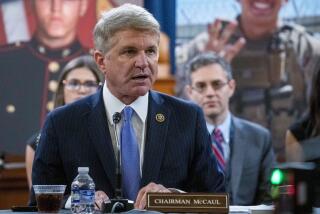Action Sought Against Soviet Pact Cheating
- Share via
WASHINGTON — In an emotion-charged session, Democratic and Republican senators criticized the Reagan Administration on Tuesday for repeatedly accusing the Soviet Union of gross and expanding violations of arms control treaties but failing to take any action in response.
Ironically, the sharp attack, led by Sen. Edward M. Kennedy (D-Mass.), was a display of bipartisanship that seemed likely to strengthen the Administration’s hand in demanding that Moscow halt its most blatant violations.
And it could also affect Administration thinking on whether to extend its adherence to the unratified second strategic arms limitation treaty, which both nations have honored, when it expires at the end of the year.
“I’m tired of hearing about gross violations, then virtually no action (occurs),” Kennedy, a longtime champion of arms control, told Assistant Defense Secretary Richard N. Perle at a Senate Armed Services Committee hearing. “When are you going to do something about it?”
Pounding his fist on his desk, the red-faced Kennedy shouted: “To say you’re still studying the matter is not acceptable. You’ve been saying that for two years now.” He pointedly told Perle, known as a hard-liner on arms negotiations: “I’m amazed you can stay part of the Administration in this circumstance.”
Perle, however, retorted that Kennedy was accusing the Administration of what Perle called “fecklessness” only a week after he voted with a majority of senators to cut the Pentagon’s fiscal 1986 budget request. Reducing defense funds is “not the most obvious way to respond” to Soviet arms violations, he asserted.
So far, appeals to Moscow have been fruitless, said Perle, who identified two other types of possible responses: neutralizing the violations, perhaps by instituting new military programs to counteract any Soviet gain, or retaliating, perhaps by a U.S. treaty violation.
‘Some Nifty Idea?’
“Or perhaps you have some nifty idea you’re not sharing with us?” Perle tartly asked Kennedy, who did not respond.
The Massachusetts senator was the most outspoken at the hearing, but other Democrats and Republicans indicated that they shared Kennedy’s frustration with the Administration’s failure to act.
Sen. John C. Danforth (R-Mo.) said the committee, concerned by the Administration’s inability to make “appropriate responses” to Soviet violations, will add a rider to the defense appropriations measure this year that would require the Pentagon to report on the military implications of the Soviet actions by July 15.
However, it was Kennedy’s sharp words that were most surprising. Sen. Dan Quayle (R-Ind.) said he welcomed them as a sign that the liberal Democrat “was prepared to play hardball” with the Soviets on the violations.
And Perle, who has long sought a firmer U.S. stand on the issue, said later that Kennedy’s sentiment--and the bipartisan support it implied--would probably would give the Administration more leverage in demanding an end to the violations as well as safeguards against further cheating.
In his opening statement, Perle told the committee that there has been “an expanding pattern of (Soviet) violations” of arms agreements dating back to 1963. Moreover, he added, the violations are “militarily significant,” although Moscow may have achieved only “minor military benefits” from them so far. He said the Joint Chiefs of Staff are still studying the issue.
More to Read
Get the L.A. Times Politics newsletter
Deeply reported insights into legislation, politics and policy from Sacramento, Washington and beyond. In your inbox twice per week.
You may occasionally receive promotional content from the Los Angeles Times.










